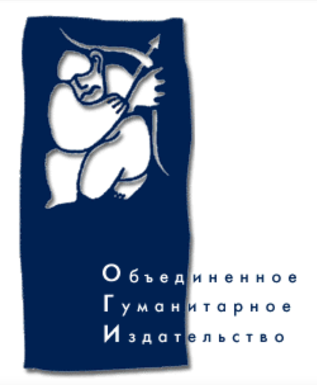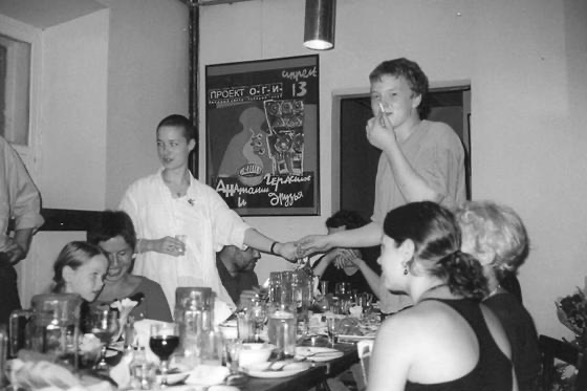Project O.G.I.
[2 items]
The United Humanities Press, or Ob”edinennoe gumanitarnoe izdatel’stvo (OGI), was a Moscow-based publishing house that released over 50 collections of poetry along with several scholarly works in the humanities. Yet its name is, more than anything, associated with Project OGI, a legendary social club established in 1998 by OGI editor-in-chief Dmitry Itskovich, publisher Nikolai Okhotin, artist Mikhail Riabchikov, and a handful of important and influential poets, writers, and critics. The food was bad, the service was worse, but the atmosphere couldn’t be beat. As one regular put it, the club had long existed around everyone’s kitchen tables, but had lacked a dedicated location. It was no surprise that the first “real” place where Project OGI’s intellectual public gathered was in a remodeled apartment on Trekhprudnyi Lane. Although the club eventually had to switch locations, it quickly became a center of Moscow intellectual and artistic life. Regular poetry readings, book launches, and concerts enhanced the atmosphere of intellectual inebriation that flowed freely from the bar into the adjoining bookstore and back.
In the first months of the club’s existence, it managed to attract two major acts, Auktsyon and Leningrad, who, during the press conference that preceded their set, broke into a spontaneous jam session. A music video by the band Korabl’ filmed in the club captures the same freewheeling energy. The place had that effect on artists, musicians, and creators of all stripes, perhaps because it represented something so new on the Moscow scene.
As music critic Maksim Semeliak recalled when the club finally closed in 2012,
In the first months of the club’s existence, it managed to attract two major acts, Auktsyon and Leningrad, who, during the press conference that preceded their set, broke into a spontaneous jam session. A music video by the band Korabl’ filmed in the club captures the same freewheeling energy. The place had that effect on artists, musicians, and creators of all stripes, perhaps because it represented something so new on the Moscow scene.
As music critic Maksim Semeliak recalled when the club finally closed in 2012,
“Project OGI caused a real revolution in Moscow. From early on, it was understood that, naturally, any successful club had to concern itself, in one way or another, with fashion, sex, and drugs. But Project OGI wasn’t about the first, the second, or the third—with limited exceptions that only proved the rule. […] In short, in the first years of its existence, Project OGI conveyed a feeling of unbelievable freedom from everything—including from the burdens of fashion, sex, and drugs.”
Even oligarchs, apparently, felt the same. Mikhail Khodorkovsky dropped by from time to time to effect his own temporary escape from the strictures of life as a 1990s-era Russian tycoon. The club’s popularity epitomized a growing exhaustion with the nineties, representing the hope for a new source of intellectual energy that would replace the empty glitz and glamour everyone seemed to be chasing in the new Russia.

